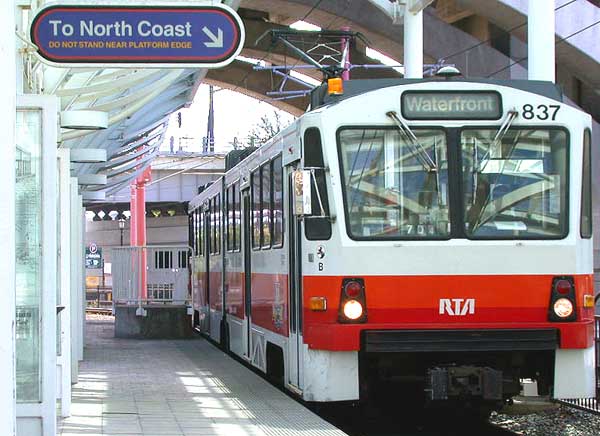I've been making the case lately that rail transit systems are very much a net loss for cities (except those with a high population density, like New York). Increasingly, I think trains are more expensive/less efficient than other forms of transportation, less flexible (locking cities into long-term decisions that they may soon regret), and in sum make a city less productive and as a result marginally poorer.
While admiting that they are a less efficient form of transporation than buses, supporters have argued that streetcars cause development to occur along the line. Others, including myself, have pointed out that this is just reshuffled development (It's like offering P&G a tax incentive to move from 5th to 13th Street and then asserting the tax incentive created a $175 Billion company). As this development is created inefficiently and very expensively, the project is a net loss to the city (especially considering the other more efficient uses for those funds).
Unfortunately, lacking from Cincy Streetcar discussions is evidence of how rail transit has actually performed in comparable cities. This post is my limited attempt to measure performance.
To create a group of peer cities to compare to Cincinnati, I took Wikipedia's list of the ten largest cities in the Midwest and then added any cities within 250 miles of Cincinnati with a population greater than 300,000 that weren't already included (Pittsburgh and Nashville). I compared changes in population since 1990. Population, in addition to being easily available, is a good proxy for economic performance and the overall job market. The change since 1990 is a good measure of a city's long-term growth and fortunately there are several comparable cities who have had train systems for this full period. I put this information into a table, along with some notes on the transportation systems of each city.
My theory going in is that rail transit is a much more expensive way to transport people than buses. Since it is relatively inefficient (except in dense metro areas), rails should be a long-term drag on the economic performance of a city. So, empirically you would expect cities with rail transit to perform worse than those with buses in the long-term. Here's what I found:
Here are the totals for all cities with and without rail:Unfortunately, lacking from Cincy Streetcar discussions is evidence of how rail transit has actually performed in comparable cities. This post is my limited attempt to measure performance.
To create a group of peer cities to compare to Cincinnati, I took Wikipedia's list of the ten largest cities in the Midwest and then added any cities within 250 miles of Cincinnati with a population greater than 300,000 that weren't already included (Pittsburgh and Nashville). I compared changes in population since 1990. Population, in addition to being easily available, is a good proxy for economic performance and the overall job market. The change since 1990 is a good measure of a city's long-term growth and fortunately there are several comparable cities who have had train systems for this full period. I put this information into a table, along with some notes on the transportation systems of each city.
My theory going in is that rail transit is a much more expensive way to transport people than buses. Since it is relatively inefficient (except in dense metro areas), rails should be a long-term drag on the economic performance of a city. So, empirically you would expect cities with rail transit to perform worse than those with buses in the long-term. Here's what I found:
These results were more or less what you would expect, although the trend is stronger than I anticipated. Chicago, an outlier in the Midwest with much higher density, does alright with rail. The other cities who have built passenger rail systems have all performed very poorly in the long run. On the other hand, those cities who have relied on bus transportation over the last 30 years have on average grown by 10%. Unfortunately Cincinnati has been the worst performer of the bus group, but is still doing better than every city with rail transit except Chicago.
I can anticipate a couple critiques of this data: First, these cities all have their own issues and transportation systems are not responsible for all variances (Detroit would still have issues with any system). It may be the case that cities that are likely to build rail systems are also likely to be poorly governed or just in relative decline already - So, correlation, not necessarily causation. I think there is some truth to this point, however transportation is still relevant (otherwise, why are we spending on it?) Another objection could be that the Cincinnati Streetcar Plan is different from those discussed here. There's some truth to this also, but this data seems to show that the more similar the transportation system to the one proposed in Cincinnati, the worse the city's performance.
Thus, my conclusion from looking at this information is that it is further good evidence that rail transportation is not a valuable investment for a city like Cincinnati. There are very strong relationships in the region between rail transit and stagnation. This is consistent with my view that rail transit (except in high density cities) is an inefficient waste that turns out to be a drag on a city's long-term performance. So, I confirmed my opinion going in... Finally, I would just encourage more tracking of actual performance of projects of this type (For example, a lot more could be done to measure performance outside of the Midwest). I have seen a disappointing lack of evidence that rail transit has or can perform well in a city like Cincinnati, only assertions that it will do exceptional things (countered by convincing evidence that it is inefficient waste). I'm open to such evidence, but suspect the lack of it is a sign that it doesn't exist.



No comments:
Post a Comment